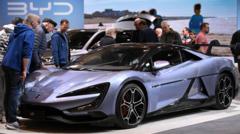In December, BYD announced record sales figures that further establish its status in the electric vehicle market, signaling intense competition with Tesla as both companies aim for the top slot in global EV sales for 2024. BYD sold an impressive 207,734 electric vehicles (EVs) during the final month of the year, achieving an annual total of 1.76 million units sold. This remarkable growth is attributed to government subsidies and discounts, which have played a crucial role in attracting consumers.
BYD's Sales Surge Puts It in Tough Competition with Tesla for EV Dominance

BYD's Sales Surge Puts It in Tough Competition with Tesla for EV Dominance
Chinese electric vehicle maker BYD significantly increases its market presence, vying for the title of the world's best-selling EV manufacturer amid mounting competition.
While Tesla has maintained a slight edge over BYD in previous sales quarters, the Shenzhen-based manufacturer has been steadily narrowing the gap. Notably, BYD's overall vehicle sales surged by more than 41% year-on-year, primarily due to the increasing popularity of hybrid cars, as well as a broader trend of accelerating car sales in China. Chinese consumers are increasingly opting for newer, more fuel-efficient vehicles due to incentives and competitive pricing driven by a crowded automotive market that includes foreign brands like Volkswagen and Toyota.
The rise of BYD and other Chinese electric vehicle manufacturers marks a stark contrast to the challenges encountered by established automakers in Western markets. For example, both Honda and Nissan have initiated merger discussions as they work to combat the aggressive competition presented by Chinese car brands. Additionally, Volkswagen has negotiated with labor unions to avert factory closures in Germany, highlighting the pressure on Western manufacturers.
As BYD’s prosperity continued into the third quarter of 2024, it also reported record revenues, outpacing Tesla for the first time with over 200 billion yuan ($28.2 billion) in revenue during the July to September period—an increase of 24% compared to last year. However, Tesla still retains a lead in the total number of EVs sold, underscoring the competitive landscape of the electric vehicle market.
Despite the challenges of expanding into international markets—exemplified by the European Union's tariffs on Chinese-made EVs and a 100% duty imposed by the U.S.—BYD remains determined to strengthen its presence in emerging economies. The company recently faced challenges in Brazil, where construction of a new factory was halted due to labor conditions concerns, but has promised to adhere to local regulations.
As the global electric vehicle race heats up, both BYD and Tesla will need to navigate these turbulent waters while they strive to capture the hearts—and wallets—of consumers worldwide.
The rise of BYD and other Chinese electric vehicle manufacturers marks a stark contrast to the challenges encountered by established automakers in Western markets. For example, both Honda and Nissan have initiated merger discussions as they work to combat the aggressive competition presented by Chinese car brands. Additionally, Volkswagen has negotiated with labor unions to avert factory closures in Germany, highlighting the pressure on Western manufacturers.
As BYD’s prosperity continued into the third quarter of 2024, it also reported record revenues, outpacing Tesla for the first time with over 200 billion yuan ($28.2 billion) in revenue during the July to September period—an increase of 24% compared to last year. However, Tesla still retains a lead in the total number of EVs sold, underscoring the competitive landscape of the electric vehicle market.
Despite the challenges of expanding into international markets—exemplified by the European Union's tariffs on Chinese-made EVs and a 100% duty imposed by the U.S.—BYD remains determined to strengthen its presence in emerging economies. The company recently faced challenges in Brazil, where construction of a new factory was halted due to labor conditions concerns, but has promised to adhere to local regulations.
As the global electric vehicle race heats up, both BYD and Tesla will need to navigate these turbulent waters while they strive to capture the hearts—and wallets—of consumers worldwide.





















